#Thank You Jeeves
Explore tagged Tumblr posts
Text
So!! I had been listening to Thank You Jeeves and noticed another parallel between Jeeves and Bertie
Near the beginning of the book Chuffy asks Bertie if he can keep a secret and Bertie is flat out “no” and Chuffy is like. Fine whatever and tells him anyway (the secret was that he was in love with Pauline)
Later Bertie brings up Chuffy’s hesitation about marrying Pauline and being like the character Lord Wotwotleigh, Chuffy asks how Bertie could possibly know about that.
And Bertie is like: “well, Jeeves told me!” Chuffy is shocked that Jeeves told his secret like that. And for the duration of the book, everytime someone tells Jeeves something in confidence, Jeeves immediately tells Bertie. But I don’t think that’s just a gag for this book. Because in Code of the Woosters, Jeeves also sucks at keeping secrets from Bertie. He makes such a fuss about Eulalie and how he cannot tell Bertie about it because it’s a rule of the Junior Ganymede and he could get kicked out. And despite all this fuss and threat, he spills the whole secret to Bertie right at the end of the book!
TL:DR Jeeves and Bertie are both garbage at keeping secrets. If you tell Jeeves something, he’s telling Bertie and vice versa
132 notes
·
View notes
Text
Bertie kept referencing his “heliotrope pajamas” in Thank You, Jeeves so I had to look up what that meant and

Wildly, this was not brought up as something Jeeves objected to. Bertie can have little a purple in his life as a treat
151 notes
·
View notes
Text

bertie is so fucking aro
111 notes
·
View notes
Text
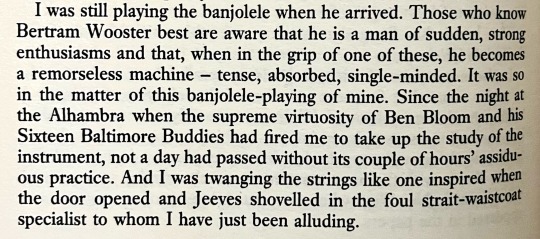
While we’re on the topic of J&W characters being neurodivergent, Thank You, Jeeves contains one of the clearest descriptions of ADHD hyperfixations I’ve ever read
151 notes
·
View notes
Text

This is so "two exes meet again" that it physically hurts.
39 notes
·
View notes
Text
Love how in Thank you, Jeeves there's whole paragraph of how much Bertie doesn't want women in bed
24 notes
·
View notes
Text
When i tell you that the 1936 movie Thank you, Jeeves is diabolical, i very well mean it! Let me recap some happenings from it so you'll understand better
It starts with Bertie playing the drums and Jeeves beside him, screaming on the phone to be heard over the 'playing'
Divorse is announsed within the first 5 minutes
A girl shows up in the night, witch means it's time for Jeeves to lock Bertie up in his bath-/bedroom for the night
They drive to a hotel together. On the way picking up a lifter and scaring him to death with Bertie's manic driving
There the gal who Bertie fell for threatens him with a gun
Jeeves is out singing and dancing along to a one man orchestra. His agressive dansing makes him fall through the floor.
More people threaten Bertie with more guns, having mistaken him as competent
Jeeves beats up close to 20 people while Bertie kinda just runs around..
Somewhere there Bertie gets engaged (by his own free will!)
The thing ends with Bertie shackled to a basement wall and this bit of dialogue between him and Jeeves:
"This place would be perfect for our honeymoon!"
"Your honeymoon, sir"
"You mean you're not coming?"
70 notes
·
View notes
Text
I haven't read "Thank You, Jeeves" yet so I should probably shut up, but "Sir Roderick Comes To Lunch" calls into question whether Jeeves truly has, or has ever had, a rule about not working for married gentlemen, like he says in "Thank You". It seems that in RODE, he acted when he learned that Honoria intended to fire him after she got married to Bertie. But if he had a rule about not working for married men, it wouldn't matter what Honoria thought of him, because he'd be out of the household anyway. It's almost like the actual rule Jeeves has is "I will do whatever it takes to keep Bertie for myself, and happy" (which means getting Bertie out of an engagement with a woman who makes him listen to her reading Ruskin and dislikes Jeeves, and also getting reunited with Bertie after Jeeves' brief stint with Chuffy).
#letters regarding jeeves#jeeves#sir roderick comes to lunch#thank you jeeves#it's good to be caught up with LRJ again for the first time since March#I loved that one moment of “omg! the scheme goes deeper! it was Spenser with the six ruined potatoes all along!” btw#so many fics take the unmarried gentlemen rule at face value and it's their right but i don't know that i believe in it at the moment#idanit talks
42 notes
·
View notes
Text
Uh oh UH OH

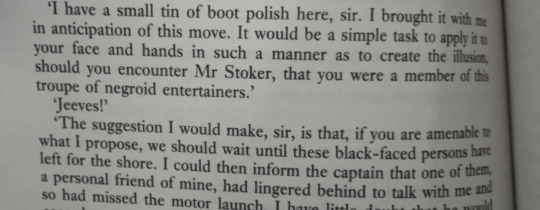
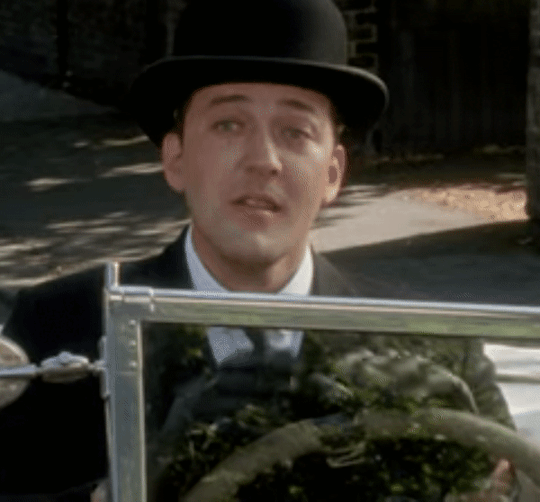
Oh gosh how bad is this about to get... I'm still plucking up the courage to read on...
33 notes
·
View notes
Text
27. Thank You, Jeeves, by P.G. Wodehouse
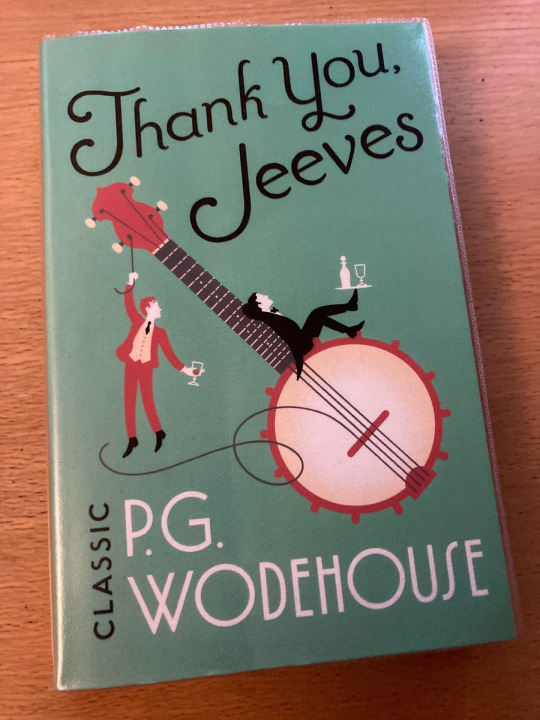
Owned: No, library Page count: 263 My summary: Thanks to his insistence on playing the banjolele, Bertie Wooster has been 1) kicked out of his flat and 2) dumped by Jeeves. But not to worry. He's out into the country, where nothing can go wrong! Except maybe love triangles, wacky escapades, imprisonment on a yacht, forced marriages, and a distinct lack of butter. Just his lucky day. My rating: 3/5 My commentary:
You know, despite my usual tastes in literature and my general predilection for the stuffy English gentleman, I've never actually engaged with any Jeeves and Wooster. I've seen clips from the Steven Fry/Hugh Laurie show, as every English person is legally required to, but I've never actually sat down to read any Wodehouse myself. Well, one of my coworkers is currently working her way through Jeeves and Wooster, and decided that I'd like it too. So, on her recommendation, I've gone in blind with this book. Let's see what it's like!
First off - Wodehouse's voice is delightful. Archaic without being impenetrable, sardonic and drawling, punning and witty in all the right ways. I was charmed and captivated from the start, not less because of how full-on it is right out of the gate. It's a very droll writing style, the kind that was definitely a spawn of the 30s; I can't imagine someone writing like that now except to satirise. Still, it's wonderfully charming. And Wooster himself is well-characterised as a complete brainless twit. He actually had a lot more heart than I was expecting from what I knew of his character, but he's still a big idiot who doesn't ever help himself out of any situation at all.
Also, like, I know calling Jeeves and Wooster gay isn't exactly the hottest of takes, but it surprised me just how gay it was. Seriously, Jeeves says that he's got a policy of never working for a married man. I can't be the only one reading implication into that. And he's always at Wooster's beck and call, even in this book where he's not technically working for him. (More on that in a bit.) And Wooster is not all that put out that the eligible young lady who is also his ex in this book isn't into him. In fact, he goes out of his way to avoid getting into a relationship with her! Any tension between them is coincidence and awkward encounters. Just…so gay.
Unfortunately with literature written in the early 1900s, and particularly literature by white people, you're gonna get some racism. In this book, it takes the form of the banjolele and the blackface. The former is the inciting incident for the novel; Wooster has to move to the country because he has taken up playing the banjolele, a cross between a banjo and a ukulele. Everyone hates the noise, but it's the instrument itself that's brought up as being the problem. Jeeves, in particular, hates it. The racial connotations of this can't be ignored - the banjo is associated with black Americans, where obviously the ukulele is a native Hawaiian instrument. But more egregiously, Wooster spends half the novel 'comically' in blackface. There is a never-seen troupe of minstrels referred to with the n-word - whether they are actually black or white people in blackface is unclear from the text, but apparently that was the contemporary term for blackface performers. And every person who sees Wooster in blackface assumes he's a devil and screams and runs away, again 'comically'. Look, I know this was written in 1934, but honestly I don't care. This is just straight-up racist. The idea of Wooster being blacked up is treated as hilarious rather than insulting, and of course not a single actual person of colour shows up at all. It leaves a sour taste in my mouth, the casualness of these stereotypes and this behaviour. It's just bad. (And apparently, the TV episode based on this book also had the blackface in 1991. Plus ca change…)
Next, we're off to the Arctic, where there's a haunting on a beached ship…
4 notes
·
View notes
Text
just noticed a subtler reference in thank you jeeves in which bertie infers jeeves as his wife when "I had only to go and get in touch with him and he would bring out pounds of butter on a lordly dish" is in fact referring to himself as Heber the Kenite and Jeeves as Jael in Judges..
2 notes
·
View notes
Text
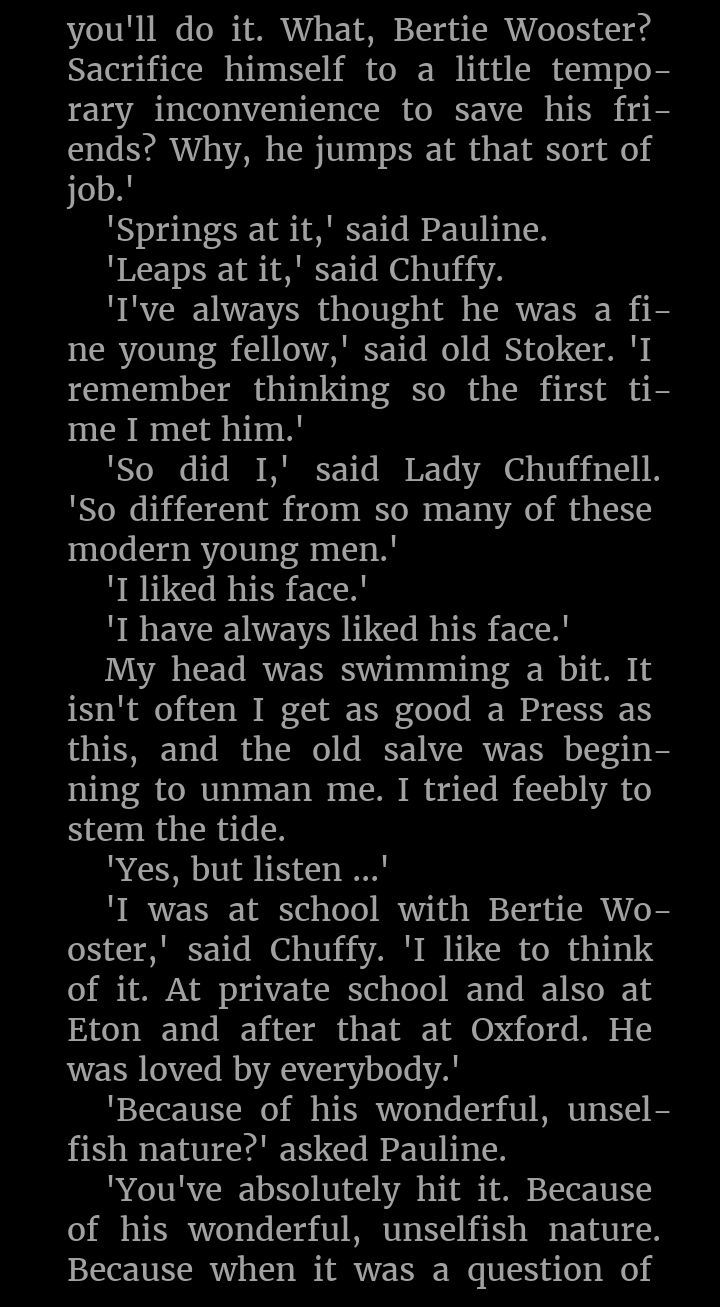
Thank you, Jeeves
P. G. Wodehouse
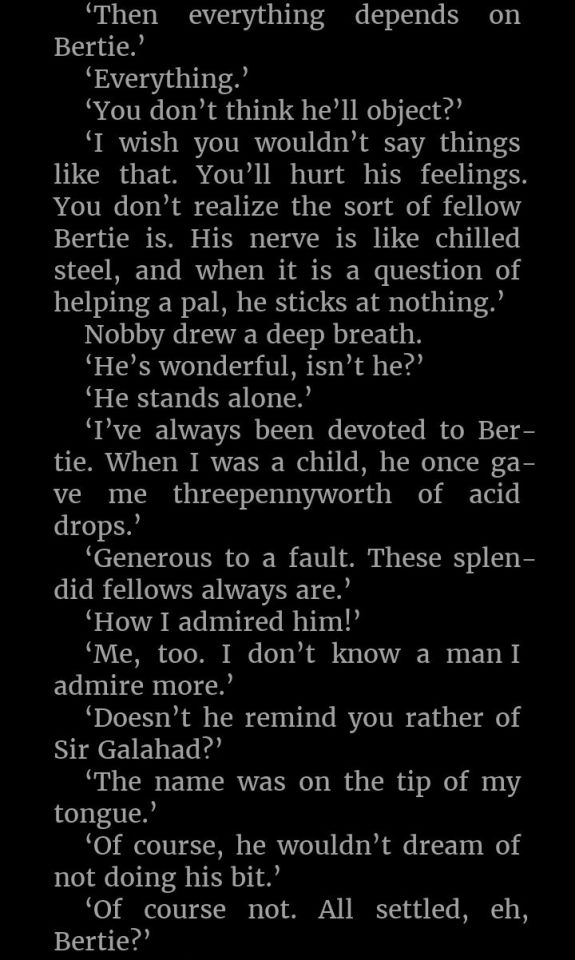
Joy in the Morning, Jeeves
P. G. Wodehouse
Enough with the gag in tv shows or books where characters talk ill of another character while they're right there in the room. Give me characters giving one the old oil as though the person weren't there.
Bonus:
Jeeves telling Bertie he's a knight in shining armor for volunteering to be a scapegoat
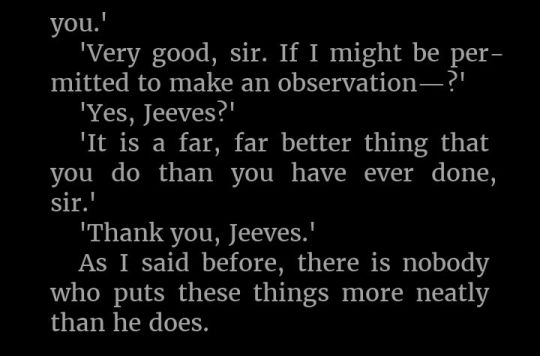
#jeeves & wooster#jeeves and wooster#bertie wooster#thank you jeeves#joy in the morning jeeves#joy in the morning#p. g. wodehouse
19 notes
·
View notes
Text
I love Jeeves’s little impromptu lectures so much and I like to think you’re right that Bertie lets him finish what he was saying later
As supporting evidence I offer this rare collaborative infodump from the end of Thank You, Jeeves:

(“that information gleam of his in his eyes”)
he’s just so excited to talk about poetry
Jeeves info dumping:

He does this sometimes with poetry, geography, clothes, and jewelry. It's lovely though ppl often cut him off :(. I like to imagine Bertie let's him speak later since he often says "nows not the time", "some other time" etc. when he does interrupt.
#his face lit up!!!!!#baby boy baby!!!!#<-prev#i would die for him your honor#🥹 let jeeves talk about his interests please it makes him so happy#autistic jeeves rights#reginald jeeves#thank you jeeves#jeeves and wooster
115 notes
·
View notes
Text
Anime only watchers and people who aren't caught up with the Manga, BEWARE... Cuz I'm about to discuss Spy X Family Mission 108... You have been warned...! 👌
[SPOILERS AHEAD FROM THIS POINT ON]
WE ARE SO BACK!!! 🗣 And this chapter was... SO DAMN GOOD! 👏😆
What an awesome early Christmas present!! 💗🤗💗 Now let's get back into the swing of things, shall we...? 😉
To start off, we pick up right where we left off with Mission 107... With Yor and Anya finding out that Melinda is a fortune teller at the sheep festival!! 😲 (Also, @yumeka-sxf shared the Japanese version of the first page of this chapter the other day with other Spy X Family Jump Festa news!! 😁)

Melinda then tells Yor to not tell anyone about her being into the occult...!! She even mentions how she believes in many things, including telepathy to Anya's surprise (though, I believe there might be a reason why Melinda is into the occult, perhaps she knows more than she's letting on? 🤔)
After Yor tells Melinda that she admires that she can do what she loves and Melinda happily thinks that Yor is into the occult too, Anya then asks Melinda to read her fortune:

I was like, "Oh gosh, what's gonna happen...? What is Melinda gonna see...?!" 😵 So as I waited with baited breath to see Melinda in action, she lays out her tarot cards to read Anya's fortune and...:

SHE'S HORRIBLE AT IT!!! ��
I mean, this could be all an act... 🤔 But for right now, I'm gonna believe that she really isn't that good at fortune telling, mainly because I think it's funny and cute...!! 😄
After reading that the grim reaper is behind Anya (A.K.A. Yor 👏😂) and saying that Anya will NEVER get another Stella Star, Melinda asks Anya if she likes Damian... Anya of course says NO because he bullies her, but Melinda appreciates that she is still trying to be friends with Damian...!! 😊 Soon Melinda starts to think about how she wasn't there for Damian during the Desmond "family" dinner back in Mission 106 and thinks that she needs to go and face Damian, then...:

HOLY SHIT, DONOVAN JUMP SCARE!!! 😱
Ever since she introduced herself as Melinda Desmond way back in Mission 65, I didn't know how to feel about this woman, I just could not figure her out... But thanks all to of these recent developments in the last few chapters that she's been in, I think that I can safely say that Melinda needs to take Damian (and Demetrius, if he isn't too far gone) AND GET THE FUCK AWAY FROM DONOVAN!! 😫 I don't know what's up with that man, but if he can make his supposed "wife" THIS SCARED OF HIM, then he definitely NEEDS TO BE STOPPED!! 👏👏👏
Moving on, Anya hears all of Melinda's conflicting thoughts, which makes Anya wonder something...:

It always warms my heart whenever Anya shows her concern and compassion for others...! 💗 Though currently for Melinda, she could not answer Anya's question and decided to leave as soon as possible... 😔 But before she goes, Yor stops Melinda to tell her something...
We then cut back the others as Anya and Yor make their return to the group...!! Becky asks how it went, and...:

GODDAMNIT BECKY, YOU ARE JUST SOOO DELUSIONAL GIRL!! 🤣
Besides Becky thinking that her fortune teller is a hack (this girl, I swear 😌) and reacting to Anya's grim reaper fortune (with Yor being adorable about it 💗), she asks Anya about her love fortune and Anya lies and tells Becky that the fortune teller told her to get invited to his house, which makes Damian to start yelling...!! 👌😌
After Anya convinces Twilight to stay longer (because he was gonna go look for Melinda, though he doesn't know that she already left), they all stay until it becomes dark before everyone decides to leave the festival. Yor thanks the Eden kids for being friends with Anya, while Damian scoffs at seeing Anya holding her mother's hand, which causes Anya to say this to him:
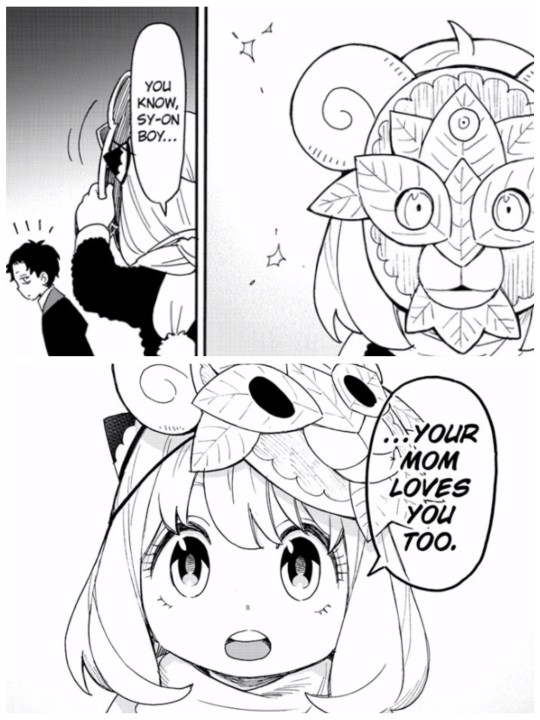
Which makes Damian flustered and then Yor chimes in reaffirming Anya's statement, causing Damian to run off...!! 🤭
After that, Jeeves and the other butlers say their goodbyes and even offer to get drinks again with Twilight sometime...!! 😊 But as they left, it reminded Twilight of something that broke my heart... 🥲

ENDO!!! 😭 WHY DO YOU ALWAYS DO THIS STUFF TO ME!!! 💔
This was literally bringing me to TEARS!! 😫 THEY REMINDED HIM OF HIS FRIENDS, I CAN'T-- 😭😭😭
Ahem...! Sorry about that... 😢 Anyway, after *sniff* that, Twilight asks if Anya enjoyed the festival, she of course did enjoy her time there and the Forgers headed home...!! 💗
After that, we see Twilight at his psychiatrist job and he has a new patient...:

IT'S FREAKING MELINDA!! 😵
Turns out the thing that Yor told Melinda was to go see Loid because he's a doctor (she also mentions that he does "concussive therapy" to his patients👏🤣), and now Loid can (hopefully) get some info from Melinda! 😲

And that was the end of chapter, and boy did I miss this...!! 😁 Not only was this chapter fantastic on SO MANY LEVELS, but it's also great to talk about a new chapter again!! 😊 This honestly the best early Christmas gift that I could ask for...!! 💗🤗💗
I am so glad that Endo is doing a lot better and I hope that he takes it easy going forward because even though I love this series with all my heart, I'd rather have Endo get as much rest and take as many breaks as he needs then to have this man die on the job just for our entertainment. Endo is a human being like every last single one of us fans, so it's always very sad to me when I see people care more about fictional characters and their worlds over the real people that make 'em...!! 😤 More people should know better, but they don't and that just sucks so much man... 😮💨
Anyway, sorry about my little tangent there... This chapter was a wonderful chapter for the series to return with and as always, I can't wait for the next one!! 😊 So until the next Mission; take care, be safe out there and be kind to one another...!! Also...
MERRY CHRISTMAS AND HAPPY HOLIDAYS Y'ALL...!! SEE YA!! 👋😄
#spy x family#sxf#spyxfamily#spy x family spoilers#sxf spoilers#spyxfamily spoilers#spy x family manga#sxf manga#spyxfamily manga#Mission 108#manga spoilers#yor forger#anya forger#melinda desmond#damian desmond#loid forger#becky blackbell#sxf jeeves#WE ARE SO FINALLY BACK Y'ALL!! 👏😆#I really missed talking about Spy × Family...! 💗🥹💗#Thank you Endo for this amazing chapter; you deserve all the rest that you can get...!! 💗🤗💗
95 notes
·
View notes
Text
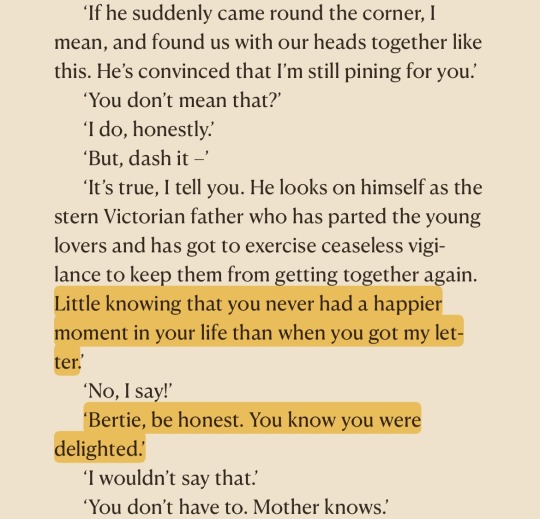
When your ex-fiancée knows you’re gay before you do
97 notes
·
View notes
Text
me: ok i'm going to start reading something new, i've read and watched a lot of sherlock holmes media for the past few months, now let's try the jeeves and wooster stories
p.g. wodehouse: try me bitch
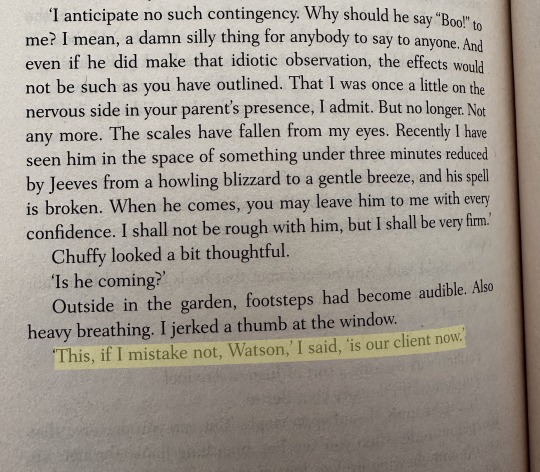
wooster LITERALLY pretends to be holmes when he correctly guesses who's at the door. comedy gold
#but also these stories are HILARIOUS#and the show is great too#gotta love laurie and fry ofc#anyways READ THE JEEVES STORIES#there were two other SH references in this book alone!! wodehouse is a fan fr#this book is called 'thank you jeeves' and it's to die for#sherlock holmes#jeeves and wooster
219 notes
·
View notes